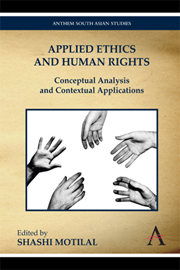Book contents
- Frontmatter
- Contents
- Preface
- Introduction
- Part One Rights, Obligations and Responsibilities
- 1 Applying Ethics: Modes, Motives and Levels of Commitment
- 2 Jurisprudence and the Individual: Bridging the General and the Particular
- 3 Why Moral Relativism Does Not Make Sense
- 4 Human Rights – A Theoretical Foray
- 5 Moral Relativism and Human Rights
- 6 Complicity and Responsibility
- 7 Dharma: The Overriding Principle of Indian Life and Thought
- 8 Moral Foundations of Social Order as Suggested in the Vaiśeṣikasūtras
- 9 Modern Western Conception of Justice as Equality before the Law and Dharmaśāstras
- Part Two Human Rights Issues
- Notes on Contributors
1 - Applying Ethics: Modes, Motives and Levels of Commitment
from Part One - Rights, Obligations and Responsibilities
Published online by Cambridge University Press: 05 March 2012
- Frontmatter
- Contents
- Preface
- Introduction
- Part One Rights, Obligations and Responsibilities
- 1 Applying Ethics: Modes, Motives and Levels of Commitment
- 2 Jurisprudence and the Individual: Bridging the General and the Particular
- 3 Why Moral Relativism Does Not Make Sense
- 4 Human Rights – A Theoretical Foray
- 5 Moral Relativism and Human Rights
- 6 Complicity and Responsibility
- 7 Dharma: The Overriding Principle of Indian Life and Thought
- 8 Moral Foundations of Social Order as Suggested in the Vaiśeṣikasūtras
- 9 Modern Western Conception of Justice as Equality before the Law and Dharmaśāstras
- Part Two Human Rights Issues
- Notes on Contributors
Summary
Ethics and the World
‘Ethics does not treat’, says Wittgenstein, ‘of the world. Ethics must be a condition of the world, like logic.’ (Wittgenstein, Notebooks, 1914–16, 77e) He seems to suggest that ethics must be a condition of the world in the same sense in which logic must be. Logic must be a condition of the world, as I take him to mean, in the sense that it determines what the world may or may not contain: the world can contain only that which is logically possible and cannot contain anything which is not. This does not mean that it contains, or must contain, all that is logically possible. It means that any x it contains, or may contain, must be logically possible. X's logical possibility is a necessary condition of its being contained in the world.
But no sense can be given to the corresponding terms ‘ethically possible’ and ‘ethically impossible’. Ethical principles do not determine the possibility or impossibility of anything they are relevant to; rather, they determine its desirability or undesirability. Of course, they are not relevant to anything and everything, but only to certain types of things, like individuals, their groups, their actions, motives, intentions, attitudes, plans and policies, projects and projections, etc. Let us then speak of ethically desirable and undesirable things, that is, things which are in accordance with, or violative of, ethical principles, and not of ethically possible and impossible things.
- Type
- Chapter
- Information
- Applied Ethics and Human RightsConceptual Analysis and Contextual Applications, pp. 3 - 32Publisher: Anthem PressPrint publication year: 2010



